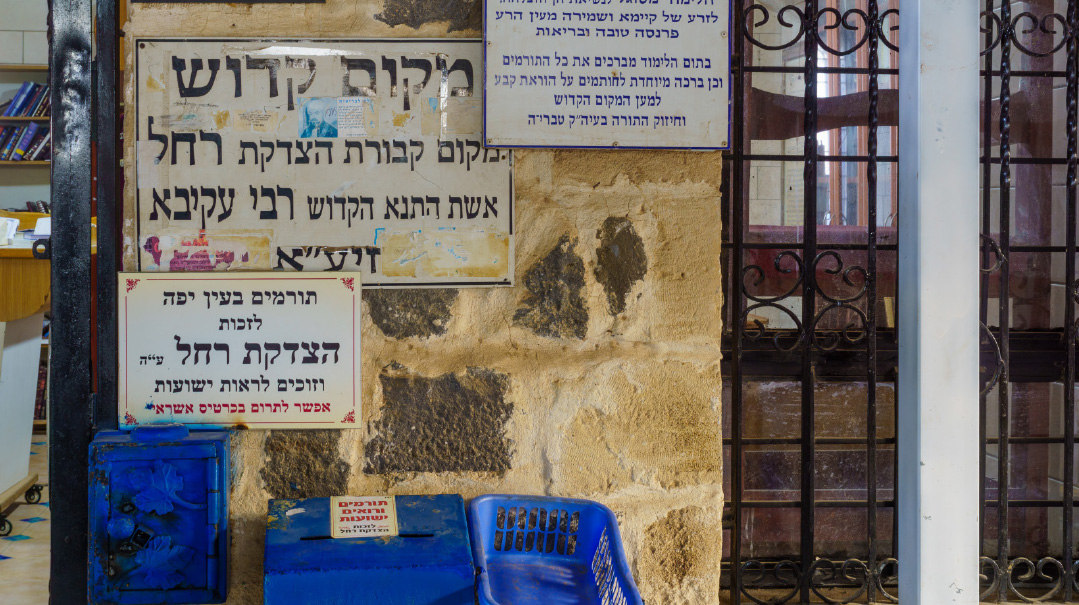All We Have Is Hers

How could Rabi Akiva say that every bit of his Torah, and even all that of his disciples, was in Rochel’s merit?

C
hazal (Yerushalmi, Shabbos 6:1) tell us that Rabi Akiva bought his wife, Rochel, a marvelous piece of jewelry called “Jerusalem of Gold” as a token of appreciation. Rabban Gamliel’s wife became jealous and demanded that her husband honor her with a similar gift.
Rabban Gamliel responded, “When your ahavas Torah equals Rochel’s, I will honor you the same way.”
We are to understand that Rochel’s ahavas Torah was a cut above that of Rabban Gamliel’s holy wife, and any other woman’s, by extension. But this is not so simple, and requires further examination.
Let’s back up a bit. Rochel was the daughter of Kalba Savua, one of the wealthiest men in Yerushalayim. Rochel herself was extraordinary and possessed all the qualities one could desire in a wife. She could have chosen any young man she wanted. But she had her eye on Akiva, a simple, illiterate, 40-year-old shepherd.
Rochel discerned noble qualities in him — and great potential. She told him she’d marry him if he would only commit to going to yeshivah after their wedding. The deal was struck. Her father, furious, disowned her. This plunged her into abject poverty, at least as long as Akiva was in kollel.
Although Rabi Akiva eventually grew to become a Torah giant, it took years before he could shed the label of am-ha’aretz. For the first few years of her marriage, Rochel was indisputably married to an ignoramus, after having had the option of marrying the top available talmid chacham. Yet she was crowned as the oheves Torah of her generation and more. How do we explain this?
Let’s suppose Rochel had chosen the best bochur. Would that have clearly demonstrated her ahavas Torah? A lot of glory goes to the girl who nabs the the big metzuyan. Rochel, however, loved the Torah more than herself. She sensed that Akiva had potential that only she could unlock. The top bochur would go on to become a big talmid chacham no matter whom he married. But she sensed that if she didn’t marry Akiva, his potential would never be realized — resulting in a huge loss for Torah.
So Rochel sacrificed, giving up her connection to her wealthy family and willingly exposing herself to years of shame and ridicule for being married to an am-ha’aretz — all so that Torah could gain a Rabi Akiva, the purveyor of Torah shebe’al peh. To make such sacrifices, one must be consumed by ahavas Torah.
The ultimate accolade, however, was not a gorgeous piece of jewelry, but Rabi Akiva’s declaration before his entire yeshivah: “Sheli v’shelachem shelah hu — all of my Torah, as well as all of yours, is hers.” This is not something Rabi Akiva would state frivolously. True, she helped him commit to Torah learning many years before. But wouldn’t some measure of credit also be due to him for all his learning in the meantime? How could Rabi Akiva say that every bit of his Torah, and even all that of his disciples, was in Rochel’s merit?
The simple answer is that Rochel gets the the credit for getting him to go to yeshivah in the first place. However, I believe Rabi Akiva’s carefully chosen words reveal the secret of how he grew from ignorant shepherd to holy Tanna.
During the Six Day War, in a shmuess at the Mir, Rav Chaim Shmuelevitz said, “Our brothers’ being killed and maimed while defending our country obligates us to learn with added hasmadah. We need to learn every minute to justify our being here rather than there.”
Rav Shmuelevitz was keenly aware of the sacrifices being made by others that allowed him to sit and learn Torah. Rabi Akiva had set the standard for this type of awareness, with his wife’s sacrifice. Her suffering, poverty, and loneliness continued day after day, only intensifying with time. The awareness of this drove Rabi Akiva to go beyond his kochos in his learning and avodas Hashem.
Some wonder why Rabi Akiva didn’t divorce his wife once he’d committed to learning 12 years. Why should she suffer like an agunah? She had accomplished her mission by sending Rabi Akiva off to yeshivah, and could now try to lead a normal life with a family.
But Rochel’s mission had only started when she sent Rabi Akiva off to yeshivah. The most difficult part came with her intense suffering. The more Rochel suffered, the harder Rabi Akiva felt obligated to toil in his learning to ultimately become one of the greatest talmidei chachamim of all time.
The Gemara tells us that when Rabi Akiva returned home, Rochel went out to meet him. Since she had no decent clothing, her neighbors offered to dress her appropriately to meet her husband. But Rochel insisted on presenting herself as she’d been for the previous 24 years. This seems perplexing, since even in aveilus, a wife is permitted to make herself attractive for her husband.
But Rochel knew that what had driven Rabi Akiva’s frantic pace for 24 years was the long-suffering wife he’d left at home. She knew that this was the image he needed to see upon arriving home. Only after that could she beautify herself for her husband. But under those circumstances, nothing could be more attractive to Rabi Akiva than to see the source of his inspiration. Only by seeing her suffering — manifested in her manner of dress, and etched on her face — could he connect with his inspiration, and then declare that all his learning and all theirs is in her credit.
As crucially important as her sacrifices over the years were, I believe Rochel’s primary contribution to Rabi Akiva’s ascent was the self-confidence she imbued in him. Understandably, as an ignorant shepherd, Akiva’s confidence was nonexistent, so Rochel went about building it up, sometimes in clever ways.
The Gemara (Kesubos 62) makes it seem like Rabi Akiva went to learn right after his wedding. However, the Midrash (Hagadol Shemos 4:13) gives a more complicated narrative. Rabi Akiva did not go immediately to yeshivah as he promised. Rochel inquired as to why.
He replied, “I’m forty years old and ignorant. I’m too embarrassed to go. Everyone will laugh at me.”
Rochel didn’t respond to this. Instead, she planted a flower pot in the small of the back of a donkey, and asked her husband to take it to the marketplace. When he returned with the donkey, she asked him how it went.
He replied, “They ridiculed me.”
She sent him again the next day. When he came home, he reported that there were some seeing this spectacle for the first time, so they laughed at him. On the third day, she sent him again — but this time he returned soon after, because no one took any interest.
“So, my dear husband,” she told Rabi Akiva, “you will go to yeshivah tomorrow. At first they will ridicule you. Then they will look you over, and soon after that, they will ignore you. Does it make sense to give up a lifetime dream over a little discomfort?”
Now, she had given up everything to marry him, on one and only one condition — that he go to yeshivah. When he didn’t fulfill his end of the bargain, it might have been understandable if she had screamed at him in anger or thrown him out of the house. Instead, her reaction was calm and thoughtful.
She understood that had she compelled Rabi Akiva to go under duress, he might not learn diligently, or at least he might not have realized his potential. Instead she invested time, patience, and chochmas hachayim. More than anything, she needed that he share her vision of his destiny for greatness. Her incomprehensible sacrifice showed her certainty of this. This, more than anything, convinced him to go.
In the end, it worked. Rabi Akiva became the head of a yeshivah with 24,000 talmidim, the largest on record. He’s today considered the greatest of Tannaim, the father of Torah shebe’al peh, known for his audacity and his fearless pursuit of the truth. Where other Tannaim stepped aside, Rabi Akiva forged ahead confidently.
One example: (Pesachim 22) Rabi Shimon darshened every “es” in the Torah but gave it up when he got to “es Hashem tira,” for Hashem is incomparable. Rabi Akiva rose to the challenge, and said that “es” comes to teach us that talmidei chachamim must also be feared and respected. There are many more such examples (Chagigah 14, Bava Metzia 62).
The crowning glory of Rochel’s total devotion to her husband and his Torah comes when he returns home with his 24,000 talmidim. Now is the time for her to get her due respect, to become the Rebbetzin, to hold court for all the wives of Rabi Akiva’s talmidim. She will be the mother of the yeshivah.
Not only had she earned this position through 24 years of suffering, but through her own merit as an exceptional woman who attained new heights of piety. She is the natural choice for court rebbetzin. Who could think otherwise?
Rochel thought otherwise. She prostrated herself at his feet and kissed them, saying, “I’m your maidservant.”
It was never about her.
When Rabi Akiva makes the dramatic declaration, “Sheli v’shelachem shelah hu,” she wants nothing but the opportunity to serve him the way he needs now. He doesn’t need a rebbetzin; he needs someone to take care of him after being alone for 24 years.
Throughout their marriage, she wanted to be the wife that Rabi Akiva needed at any particular phase of his life. First, he needed a strong woman to build him, to infuse him with ahavas Torah, and to build his confidence. After becoming the gadol hador who’s been alone for 24 years, more than anything he needs a wife who will care for him.
In truth, she was always his maidservant, but from then on she’d be that in an obvious way.
It’s difficult to fathom a more selfless wife in total devotion to her husband’s needs, and Chazal seemingly concur. It says (Avos D’Rabi Nosson 6:2) that on Judgment Day, the poor will be judged for the time they failed to devote to learning Torah.
They will say in their defense, “We were too poor to learn.”
Hashem will say, “Were you poorer than Rabi Akiva? And yet he toiled in Torah incessantly.”
The poor will respond, “But he had Rochel for a wife.”
And with this retort, the conversation ends. Hashem is in complete agreement.
We mustn’t conclude our appreciation of Rochel without mentioning Rabi Akiva’s appreciation of her. Clearly his statement “Sheli v’shelachem shelah hu” testifies that Rabi Akiva understood that he would still be a shepherd without Rochel. But this is only the tip of the iceberg: He also gave her a priceless piece of jewelry.
But a little-known midrash (Midrash Hagadol, p. 36) adds a lot more color to this gift. It seems that Rochel was not pleased with this gift at first, so their sons protested, “Abba, you are embarrassing Ima.” Rochel came from enormous wealth, but she had rejected this life. This ostentatious jewelry threw her back to what she had escaped from.
Rabi Akiva responded, “This is the least I can do for her, considering the suffering and deprivation she endured so I could grow in Torah.”
Rabi Akiva described that suffering in great detail, and this seems to have been acceptable to his sons, and by extension to Rochel.
How baffling, for this answer does not address their cry. They certainly knew their parents’ life history and still felt that their mother was being embarrassed. So what does it accomplish to repeat the litany?
I think that Rabi Akiva’s response to his sons is powerful. He was telling his sons that this gift was not something Rochel needed or even wanted, but something he needed to give to her. He recounted all the details of her suffering to demonstrate to them that he had never forgotten it for one moment. It may have been ancient history to them, but he relived it every day. This piece of jewelry was the ultimate manifestation of hakaras hatov that Rabi Akiva so urgently needed to express.
Both Rabi Akiva and Rochel are singular figures in Jewish history, and these stories about them hold so much that we can learn from. May we be zocheh this Lag B’omer to gain an inspiration from them that carries us to Matan Torah. —
Dedicated to my dear mother Rebbetzin Chassia Sorotzkin, who embodied these ideals of ahavas Torah. Her 38th yahrtzeit was last week. I, too, can declare “Sheli v’shelachem shelah hu.”
Rabbi Yosef Sorotzkin is the rosh yeshivah of Me’or Eliyohu in Kiryat Telz Stone, Israel, and the author of Meged Yosef al HaTorah.
(Originally featured in Mishpacha, Issue 1061)
Oops! We could not locate your form.







